#international day of basque language
Text
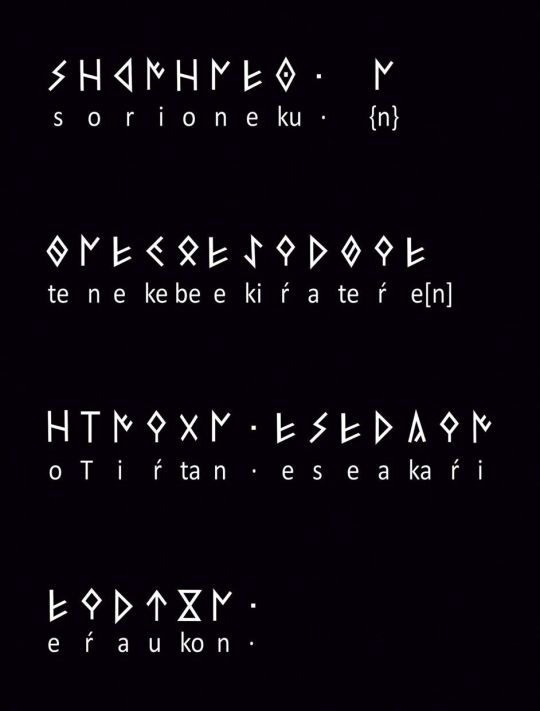
The oldest words written in proto-Basque.
They appeared on the Hand of Irulegi, a metal piece that was found in 2021 and dates back to around 80BCE.
They're still being studied to achieve a translation, but the first one - sorioneku - had a great impact in every Basque speaker due to its stounding resemblance to modern Basque zorioneko: lucky, for good luck. It has already become a Basque symbol and you'll find it in many souvenirs.
It's not crazy to think that the word meant the same 2,000 years ago since the hand was a presumed lucky charm that used to be hung over the door of a house; so maybe the inscription starts something like "lucky be the ones of this house". We'll have to wait for a proper translation, though!
#euskal herria#basque country#pays basque#pais vasco#euskadi#nafarroa#irulegiko eskua#hand of irulegi#proto basque#euskararen nazioarteko eguna#international day of basque language
96 notes
·
View notes
Text
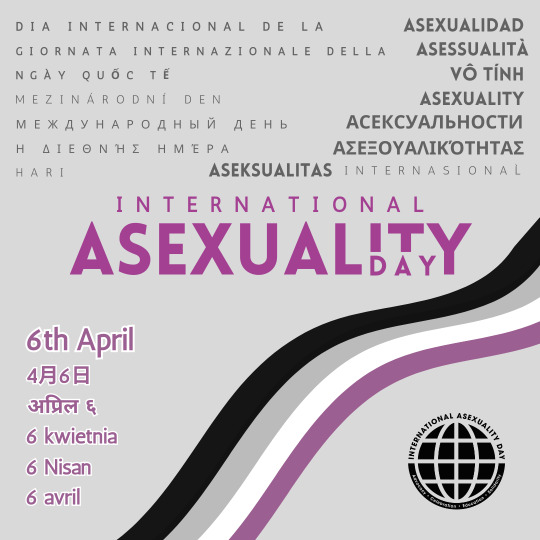














We’re excited to announce the fourth annual International Asexuality Day (IAD), taking place on April 6th, 2024! IAD is a worldwide event dedicated to asexual advocacy, celebration, education, and solidarity, with a special emphasis on countries that have had less ace coverage so far.
Stay tuned to hear about livestreams, in-person meetups and other activist activities that are being planned around the world. We will post about these on our website (https://internationalasexualityday.org/en), and make sure to also follow us Twitter and Instagram (https://linktr.ee/IADofficial) as we’ll also be updating you on this year activities there!
If you are part of an organisation or you’re an individual activist and would like to submit your plans for IAD, please do so by filling in this form .
Celebrating IAD can also be as simple as using the day as an excuse to start a conversation about asexuality in your local area, so don’t feel down if you cannot do something big. Even a repost for other’s activities is enough and can go a long way
If you have any accessibility needs, please reach out to [email protected]. For any other questions or to get involved, you can message us at [email protected]
We have translated the announcement into 12 different languages, which you can find as pictures in this post. Each picture contains the written version as image description for accessibility. The languages, in alphabetical order, are:
Basque
Catalan
Czech
Danish
Dutch
French
German
Greek
Italian
Nepali
Polish
Slovak
Spanish
#iad2024#asexuality#asexualitat#aseksualitetsdag#aseksualiteit#asexualité#asexualität#Ασεξουαλικότητας#asessualità#asexualidad#acespec#lgbtqia+
80 notes
·
View notes
Text
today is yesterday was the international mother language day, so i thought i could make a post about the languages spoken in spain!
all of this data will come out of wikipedia, so i'm sorry if there's something wrong. i now realise i could've planned this way more, it's my bad honestly, i'm sorry.
anyways, let's start with the mother tongue map of spain; each color represents one language:
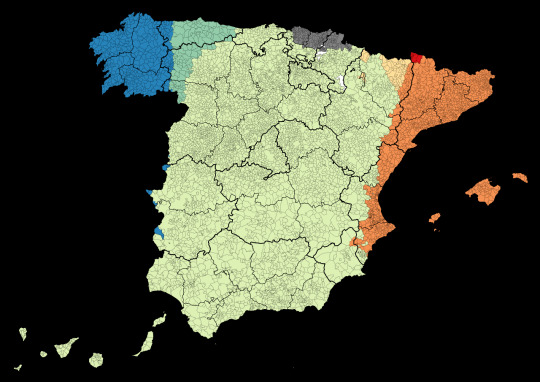
light green: spanish, galician: blue, catalan: orange, euskera: grey, aranese: red, asturleonese: green, aragonese: yellow.
the blue dots in extremadura are fala (then northernmost one), and most likely portuguese like the one spoken in olivença (thanks @satyrwaluigi).
by comparision, here's a map with the recognized co-oficial languages (spanish is the national language, and in various regions some languages have a co-oficial status)
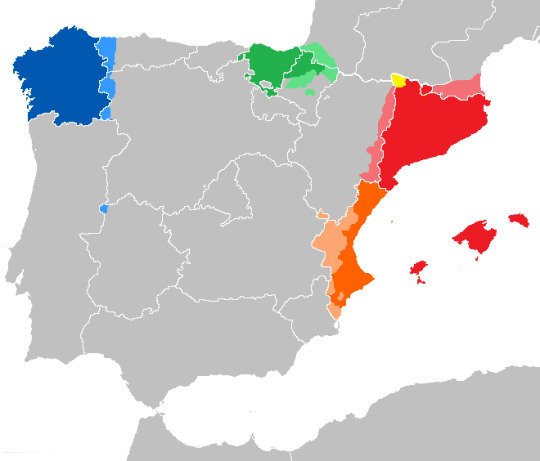
the lighter colours refer to different categories depending of the language:
lighter blue refers to areas where galician is recognized as a minoritized language but isn't co-oficial
lighter green refers to areas where euskera is recognized as a minoritized language but isn't co-oficial
lighter red refers to areas where catalan is spoken but isn't co-oficial
lighter orange refers to areas where valencian is the official language but isn't spoken.
the reasoning behind the separating catalan and valencian into two distinct languages is a complex one, if you want more info @useless-catalanfacts made a great post about it (and here is even more info about the topic they very nicely provided me with). in a nutshell, valencian is not a distinct language from catalan and the reason why it's listed as such is political.
as you can see, there are some languages, mainly aragonese and asturleonese, that aren't recognized as co-oficial languages in their respective regions despite the large number of speakers. this makes them especially vulnerable to linguistic colonialism, and is why thousands of peoples from those areas are fighting in order to make their languages official in the state's eyes. if someone knows of organizations or groups that are involved in this movement, please let me know and i'll add them to the post.
apart from the aforementioned catalan blog, here in tumblr there's really great blogs about iberian minoritized languages; i personally recommend @beautiful-basque-country and @minglana for euskera and aragonese respectively, but i am sure there's more.
also, there are some languages that are not even mentioned in the maps despite its critical situation that i thought i should remark here:
fala, as stated before, is spoken in the borders between portugal and extremadura and it heavily borrows from portuguese. it has an estimated 11k native speakers.
caló is the language of the iberian roma people. it has an estimated 60k native speakers between spain and portugal.
darija, the arabic variant native to morocco, is also spoken in ceuta, a city of 80k inhabitants.
tarifit / riffian, a tamazight variant spoken in the rif area of northern africa, including the city of melilla, with 86k inhabitants.
finally, apart from the autochtonous languages, there are also several languages brought by the migrant population, who should also be counted in this post. here are all the languages spoken in spain; the first number is of native speakers, the second one of non-native speakers, and the third one is the total:

the languages translated into english are: spanish, catalan / valencian, galician, arabic, romanian, euskera, english, german, portuguese, asturleonese, italian, bulgarian, wu chinese, french, spanish sign language, aragonese, caló, catalan sign language, basque sign language, riffian, aranese, fala.
#spain#iberia#languages#spanishmaravillas#i'm no longer gonna use typicalspanish cause there's a blog with that name that i may or may not be involved with#so i'll tag my posts with spanishmaravillas from now on
110 notes
·
View notes
Note
Your breakdown of who speaks Catalan is very interesting. What was shocking to me was how you said how Rinsy speaks Catalan. He was born in Barcelona so I would’ve imagined it’s the other way around with favoring Catalan more. But I can understand why Spanish is more favored. Also with Dani, I feel like he knows so many languages(as far as I know it’s Catalan, Spanish, Italian, English, and I know there’s at least one clip of him speaking French), he picks one for the day like picking out a shirt
I know you listed several regions that speak Catalan, but how common is it that Catalan is taught as a secondary language in Spain?? You said that some can hear it, but respond in Spanish or they respond in a more Spanish way. I don’t know much about Catalan, but it’s been fun learning a bit about it via MotoGP
Nope Rins speak the way he speaks Catalan because HE IS from Barcelona. Basically the "pure" Catalan comes from outside the big cities.
During the 60s and 70s, there was a massive moviment of people from different parts of Spain towards Basque Country, Madrid (city) and Catalonia, that was the places where the industry was building and expanding, so basically they moved to the big cities.
In the case of Barcelona and the surroundings, the was a lot of people coming from Andalusia and Extremadura (South areas of Spain) that, plus the prohibition of speaking Catalan during the dictatorship (1939-1975) made that a whole generation didn't speak Catalan at all. (Fun fact! From a class of 20-24 students only 1 classmate had 4 grandparents born and raised in Catalonia back in early 2000 and I was the only one that had none).
Places that weren't so affected by that influx of people kept the Catalan "pure", but not Barcelona. Another factor for Barcelona not having the "purest" Catalan is because it has become and international city, so having to choose between Catalan or Spanish, people will tend to use Spanish because there are more people who learn it.
Rins will end to favour the Spanish-like words and the Spanish sounds of the words when possible or straight up answering in Spanish. I do know that his family is from a close town to the Aragón circuit (Alcañiz) so I imagine he does speak Spanish at home rather than Catalan, which is fine I do the same.
Favouring Catalan or Spanish just comes from your surroundings. If all your friends/family/teachers speak Catalan, you will speak with them in Catalan. Altought there's something funny going on, people do not call names in Catalan because how the language has been treated over the years, it's becoming kind of a "cult" language, which make it difficult to joke and make fun of your friends when you have to use words like "Calçasses" instead of an cabrón (asshole).
Yeah, Dani speaks a lot of languages, and most of the time is self-taught (or at least I remember he said that some time ago). I have hear him in Catalan, Spanish, English and Italian. I think there a video of him speaking French and I think he lives in a French speaking area in Switzerland, so he can choose and jump between several languages. But I think it ultimately comes to whom is he speaking. I think he spoke Catalan with Marc and Italian with Vale or any other Italian rider. I think with Pol is depending if there's a third party involved to choose between one or another.
youtube
Here Dani speaking some Japanese.
I only mentioned the areas where is spoken in Spain. Catalan is also spoken outside, in Andorra (where is the official language and the only country that has Catalan as an official language), Northern Catalonia (which is the South of France) and Alghero in Italy. Or at least that is what I have been taught since I was a child.
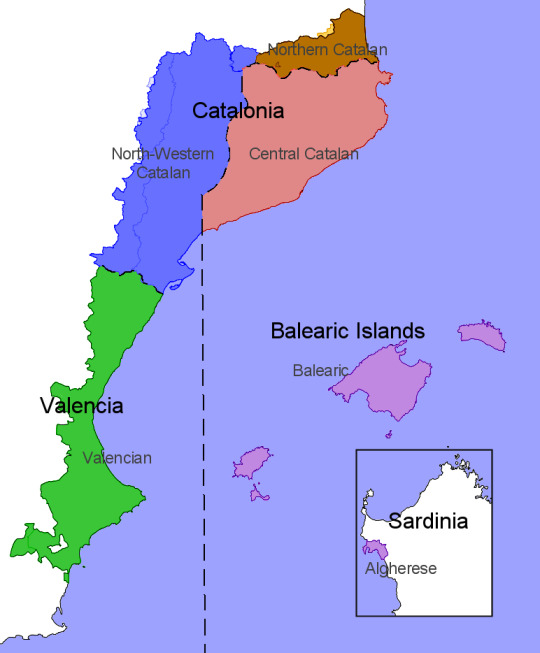
In Spain, school starts at age 3-4 years old (we go by all the students born in the same year go t the same grade and school starts in September) until 15-16 years old. I can only speak from my experience in Catalonia, but we where taught most of the subjects in Catalan with the exception of Spanish (Grammar, vocabulary and literature) and English. We also had a classes to learn Catalan grammar, vocabulary and literature). There could be some wild teacher who decided to do their classes in Spanish for some reason, but it was not the norm. Even at University, most of my professors did classes in Catalan, although they could choose the language.
At university I had classmates from Menorca and from Valencia and they both spoke Catalan as their first language, so at least I know they had Catalan as a subject, what I don't know it's it the rest of the schooling was done in Catalan or Spanish.
Catalan has 2 big "dialects" (Western and Easter) and several smaller ones. You can actually know who is from where they are or where they have been taught by the way the speak their vowels, and some consonats. Like for example, Maverick who is from Gerona (another area from Catalonia) speaks much more softer than Pol or Dani (who again has one of the most amazing Central dialects I hear). And they speak different than Marc, who is more harsher due to the lack of a neutral vowel sound (it's in between a and e sound because he speaks a complet different big dialect).
youtube
youtube
youtube
youtube
Rins speaks Barceloní, which is the dialect spoken in Barcelona and the area and surroundings and one of the characteristics s actually the influence of the Spanish in the way the pronounce it. He also uses Spanish terms because he thinks in Spanish and then he translates, so sometimes his word choice is not the correct one, but it's okay, we understand it.
youtube
One of the reason why people would no answer in Catalan when asked something in Catalan is because they don't feel confident when speaking it. As I said, Catalan is becoming a "cult" language, reserved only for some spaces and kids are not using as much as before. It doesn't help that over the years it has been persecuted, banned and discredited.
In the case of Jorge Lorenzo, who actually say he learnt it, but doesn't speak it, it's due to his chaotic education he had. He missed a lot of school to go racing, at some point he moved from Mallorca to Barcelona (which are 2 different dialects) and I remember he say his dad made him choose between school and racing at some point. I think Jorge doesn't feel confident enough to talk it, so journalist just ask in Catalan because Jorge is okay with that (because the polite thing would be to switch to Spanish, which is done with other people).
I hope you can see all the videos. I know you won't understand them,, but at least you can see some differences in the way they talk.
If you want to know more about Catalan, I recommend the blog @useless-catalanfacts they know more about the differences and how is taught in different parts of Spain. There are also resources to learn Catalan too
16 notes
·
View notes
Text
Holidays 12.3
Holidays
Advocate's Day (India)
Alka Seltzer Day
Be a Blessing Day
Cedar Tree Day (French Republic)
Day of the Secretary (Chile)
Doctor’s Day (Cuba)
E-Discovery Day
Family & Consumer Sciences Day
Flag Day (Saba)
Flamenco Guitar Day
Heart Transplant Day
Inflatable Pig Day
International Baboon Day
International Day of Persons with Disabilities (UN)
International Day of the Basque Language
Jazz Day
King Tupou I Day (Tonga)
Let's Hug Day
Make a Gift Day
National Dorothy Day
National Harley Day
National Heather Day
National Isaac Day
National Lisa Day
National Phenylketonuria (PKU) Awareness Day
National Pig Tail Day
National Ronald Day
National Roof-Over-Your-Head Day
Reinvigorate Your Brain by Reading Something Day
Saba Day (Saba)
San Francisco Javier (Navarra, Spain)
Takata no Inoko (Peace & Good Harvest Festival; Japan)
Telescope Day
3D Printing Day
Tinsel Day
Tree Dressing Day (UK)
Walt Disney World Day
World No Pesticide Use Day
Food & Drink Celebrations
Holiday Ale Festival begins (Portland, Oregon) [Begins in late Nov/early Dec] (Postponed for 2023)
International Trappist Beer Day
National Apple Pie Day [also 5.13]
National Green Bean Casserole Day
National Ice Cream Box Day
National Peppermint Latte Day
Roquefort Day
1st Sunday in December
1st Sunday in Advent [4th Sunday before Xmas] (a.k.a. ...
Adventssonntag (Germany)
Advent Sunday
Hope Sunday
Midwinter Horn Blowing (Netherlands)
Good Neighborliness Day [1st Sunday]
World AIDS Sunday [1st Sunday]
World Ice Skating Day [1st Sunday]
Independence Days
Edenia (a.k.a. Imperial Union of Edenia; Declared; 2017) [unrecognized]
Illinois Statehood Day (#21; 1818)
Feast Days
Abbo of Auxerre (Christian; Saint)
Abraham of Alexandria, Pope (Coptic)
Adrian (a.k.a. Ethernan; Christian; Saint)
Birinus (Christian; Saint)
Bogatir Svatogor Day (Asatru/Slavic Pagan)
Bona Dea Festival (Roman Goddess of Good)
Cassian of Tangier (Christian; Saint)
Copernicus (Positivist; Saint)
Emma (of Lesum or of Bremen; Christian; Saint)
Festival for Serket/Selket (Scorpion Goddess; Ancient Egypt)
Francis Xavier (Christian; Saint)
Gilbert Stuart (Artology)
Godzilla Day (Church of the SubGenius; Saint)
International Say No to Selfies Day (Pastafarian)
Johann Nepomuk von Tschiderer zu Gleifheim (Christian; Blessed)
Lucius (Christian; Saint)
Max Meldrum (Artology)
Mengloth’s Day (Pagan)
Motorettes (Muppetism)
Pompaia (Procession to Zeus; Ancient Greece)
Sola (Christian; Saint)
Vibrator Day (Pastafarian)
Zephaniah (Christian; Saint)
Lucky & Unlucky Days
Prime Number Day: 337 [68 of 72]
Shakku (赤口 Japan) [Bad luck all day, except at noon.]
Premieres
The BBC Television Shakespeare (UK TV Series; 1978)
Black Swan (Film; 2010)
Brown Sugar, recorded by The Rolling Stones (Song; 1969)
Bullwinkle Cleans Up or The Desperate Showers (Rocky & Bullwinkle Cartoon, S5, Ep. 236; 1963)
Camelot (Broadway Musical; 1960)
The Chanukah Song, by Adam Sandler (Song; 1994)
Concerto in F, by George Gershwin (Piano Concerto; 1925)
Confess, by Patti Page (Song; 1947) [1st Recording with Overdubbed Vocals]
Dark Was the Night, Cold Was the Ground, recorded by Blind Willie Johnson (Song; 1927)
Do They Know It’s Christmas? (Charity Song; 1984)
Elvis (Comeback TV Special; 1968)
High Note (WB LT Cartoon; 1960)
House of Flying Daggers (Film; 2004)
A Leak in the Lake or The Drain Maker (Rocky & Bullwinkle Cartoon, S5, Ep. 235; 1963)
I Love You Phillip Morris (Film; 2010)
Justify My Love, by Madonna (Music Video; 1990)
Machine Head, recorded by Deep Purple (Album; 1971)
My Generation, by The Who (Album; 1965)
The Oregon Trail (Video Game; 1971)
The Power of the Dog, by Thomas Savage (Novel; 1967)
Rudolph the Red-Nosed Reindeer (Christmas TV Special; 1964)
Rubber Soul, by The Beatles (Album; 1965)
Spud (Film; 2010)
A Streetcar Named Desire, by Tennessee Williams (Play; 1947)
Symphony #1 in A, by Edward Elgar (Symphony; 1908)
A Taste of Catnip (WB MM Cartoon; 1966)
Thanks to the Saint, by Leslie Charteris (Short Stories 1957) [Saint #33]
Unknown Soldiers, by Väinö Linna (Novel; 1954)
The Weapon Shops of Isher, by A.E. van Vogt (Novel; 1951)
Wild (Film; 2014)
You’re Sixteen, by Ringo Starr (Song; 1973)
Today’s Name Days
Emma, Franz Xaver, Jason (Austria)
Franjo, Lucije, Sofonija (Croatia)
Svatoslav (Czech Republic)
Svend (Denmark)
Leiger, Leino (Estonia)
Meri, Vellamo (Finland)
François-Xavier, Xavier (France)
Franz Xaver, Jason (Germany)
Glykerios (Greece)
Ferenc, Olívia (Hungary)
Francesco, Saverio (Italy)
Daile, Evija, Jogita, Raita (Latvia)
Atalija, Audinga, Gailintas, Ksaveras (Lithuania)
Svein, Sveinung (Norway)
Franciszek, Kasjan, Ksawery, Lucjusz, Unimir (Poland)
Gheorghe (România)
Oldrich (Slovakia)
Francisco, Javier (Spain)
Lydia (Sweden)
Javier, Malcolm, Malcom, Malik, Xavier, Xaviera (USA)
Today is Also…
Day of Year: Day 337 of 2024; 28 days remaining in the year
ISO: Day 7 of week 48 of 2023
Celtic Tree Calendar: Ruis (Elder) [Day 6 of 28]
Chinese: Month 10 (Gui-Hai), Day 21 (Yi-Wei)
Chinese Year of the: Rabbit 4721 (until February 10, 2024)
Hebrew: 20 Kislev 5784
Islamic: 20 Jumada I 1445
J Cal: 7 Zima; Sevenday [7 of 30]
Julian: 20 November 2023
Moon: 65%: Waning Gibbous
Positivist: 1 Bichat (13th Month) [Copernicus]
Runic Half Month: Is (Stasis) [Day 8 of 15]
Season: Autumn (Day 71 of 89)
Zodiac: Sagittarius (Day 12 of 30)
Calendar Changes
Bichat (Modern Science) [Month 13 of 13; Positivist]
1 note
·
View note
Text
Holidays 12.3
Holidays
Advocate's Day (India)
Alka Seltzer Day
Be a Blessing Day
Cedar Tree Day (French Republic)
Day of the Secretary (Chile)
Doctor’s Day (Cuba)
E-Discovery Day
Family & Consumer Sciences Day
Flag Day (Saba)
Flamenco Guitar Day
Heart Transplant Day
Inflatable Pig Day
International Baboon Day
International Day of Persons with Disabilities (UN)
International Day of the Basque Language
Jazz Day
King Tupou I Day (Tonga)
Let's Hug Day
Make a Gift Day
National Dorothy Day
National Harley Day
National Heather Day
National Isaac Day
National Lisa Day
National Phenylketonuria (PKU) Awareness Day
National Pig Tail Day
National Ronald Day
National Roof-Over-Your-Head Day
Reinvigorate Your Brain by Reading Something Day
Saba Day (Saba)
San Francisco Javier (Navarra, Spain)
Takata no Inoko (Peace & Good Harvest Festival; Japan)
Telescope Day
3D Printing Day
Tinsel Day
Tree Dressing Day (UK)
Walt Disney World Day
World No Pesticide Use Day
Food & Drink Celebrations
Holiday Ale Festival begins (Portland, Oregon) [Begins in late Nov/early Dec] (Postponed for 2023)
International Trappist Beer Day
National Apple Pie Day [also 5.13]
National Green Bean Casserole Day
National Ice Cream Box Day
National Peppermint Latte Day
Roquefort Day
1st Sunday in December
1st Sunday in Advent [4th Sunday before Xmas] (a.k.a. ...
Adventssonntag (Germany)
Advent Sunday
Hope Sunday
Midwinter Horn Blowing (Netherlands)
Good Neighborliness Day [1st Sunday]
World AIDS Sunday [1st Sunday]
World Ice Skating Day [1st Sunday]
Independence Days
Edenia (a.k.a. Imperial Union of Edenia; Declared; 2017) [unrecognized]
Illinois Statehood Day (#21; 1818)
Feast Days
Abbo of Auxerre (Christian; Saint)
Abraham of Alexandria, Pope (Coptic)
Adrian (a.k.a. Ethernan; Christian; Saint)
Birinus (Christian; Saint)
Bogatir Svatogor Day (Asatru/Slavic Pagan)
Bona Dea Festival (Roman Goddess of Good)
Cassian of Tangier (Christian; Saint)
Copernicus (Positivist; Saint)
Emma (of Lesum or of Bremen; Christian; Saint)
Festival for Serket/Selket (Scorpion Goddess; Ancient Egypt)
Francis Xavier (Christian; Saint)
Gilbert Stuart (Artology)
Godzilla Day (Church of the SubGenius; Saint)
International Say No to Selfies Day (Pastafarian)
Johann Nepomuk von Tschiderer zu Gleifheim (Christian; Blessed)
Lucius (Christian; Saint)
Max Meldrum (Artology)
Mengloth’s Day (Pagan)
Motorettes (Muppetism)
Pompaia (Procession to Zeus; Ancient Greece)
Sola (Christian; Saint)
Vibrator Day (Pastafarian)
Zephaniah (Christian; Saint)
Lucky & Unlucky Days
Prime Number Day: 337 [68 of 72]
Shakku (赤口 Japan) [Bad luck all day, except at noon.]
Premieres
The BBC Television Shakespeare (UK TV Series; 1978)
Black Swan (Film; 2010)
Brown Sugar, recorded by The Rolling Stones (Song; 1969)
Bullwinkle Cleans Up or The Desperate Showers (Rocky & Bullwinkle Cartoon, S5, Ep. 236; 1963)
Camelot (Broadway Musical; 1960)
The Chanukah Song, by Adam Sandler (Song; 1994)
Concerto in F, by George Gershwin (Piano Concerto; 1925)
Confess, by Patti Page (Song; 1947) [1st Recording with Overdubbed Vocals]
Dark Was the Night, Cold Was the Ground, recorded by Blind Willie Johnson (Song; 1927)
Do They Know It’s Christmas? (Charity Song; 1984)
Elvis (Comeback TV Special; 1968)
High Note (WB LT Cartoon; 1960)
House of Flying Daggers (Film; 2004)
A Leak in the Lake or The Drain Maker (Rocky & Bullwinkle Cartoon, S5, Ep. 235; 1963)
I Love You Phillip Morris (Film; 2010)
Justify My Love, by Madonna (Music Video; 1990)
Machine Head, recorded by Deep Purple (Album; 1971)
My Generation, by The Who (Album; 1965)
The Oregon Trail (Video Game; 1971)
The Power of the Dog, by Thomas Savage (Novel; 1967)
Rudolph the Red-Nosed Reindeer (Christmas TV Special; 1964)
Rubber Soul, by The Beatles (Album; 1965)
Spud (Film; 2010)
A Streetcar Named Desire, by Tennessee Williams (Play; 1947)
Symphony #1 in A, by Edward Elgar (Symphony; 1908)
A Taste of Catnip (WB MM Cartoon; 1966)
Thanks to the Saint, by Leslie Charteris (Short Stories 1957) [Saint #33]
Unknown Soldiers, by Väinö Linna (Novel; 1954)
The Weapon Shops of Isher, by A.E. van Vogt (Novel; 1951)
Wild (Film; 2014)
You’re Sixteen, by Ringo Starr (Song; 1973)
Today’s Name Days
Emma, Franz Xaver, Jason (Austria)
Franjo, Lucije, Sofonija (Croatia)
Svatoslav (Czech Republic)
Svend (Denmark)
Leiger, Leino (Estonia)
Meri, Vellamo (Finland)
François-Xavier, Xavier (France)
Franz Xaver, Jason (Germany)
Glykerios (Greece)
Ferenc, Olívia (Hungary)
Francesco, Saverio (Italy)
Daile, Evija, Jogita, Raita (Latvia)
Atalija, Audinga, Gailintas, Ksaveras (Lithuania)
Svein, Sveinung (Norway)
Franciszek, Kasjan, Ksawery, Lucjusz, Unimir (Poland)
Gheorghe (România)
Oldrich (Slovakia)
Francisco, Javier (Spain)
Lydia (Sweden)
Javier, Malcolm, Malcom, Malik, Xavier, Xaviera (USA)
Today is Also…
Day of Year: Day 337 of 2024; 28 days remaining in the year
ISO: Day 7 of week 48 of 2023
Celtic Tree Calendar: Ruis (Elder) [Day 6 of 28]
Chinese: Month 10 (Gui-Hai), Day 21 (Yi-Wei)
Chinese Year of the: Rabbit 4721 (until February 10, 2024)
Hebrew: 20 Kislev 5784
Islamic: 20 Jumada I 1445
J Cal: 7 Zima; Sevenday [7 of 30]
Julian: 20 November 2023
Moon: 65%: Waning Gibbous
Positivist: 1 Bichat (13th Month) [Copernicus]
Runic Half Month: Is (Stasis) [Day 8 of 15]
Season: Autumn (Day 71 of 89)
Zodiac: Sagittarius (Day 12 of 30)
Calendar Changes
Bichat (Modern Science) [Month 13 of 13; Positivist]
0 notes
Text
A visit to San Sibilia
Extract from the journal of Woolwich Lyons, cartographer of the International Peace Conference, March 1919.
3 March, 1919
In order to ensure that war never again despoils the continent of Europe or its diverse colonies, it has been agreed that the borders between all nation-states be fixed upon natural and objectively-established boundaries. While some are easy to establish with the stroke of a pen - the Rhine, the English Channel, the Danube - it is equally important to rationally demarcate the more difficult territories.
For that reason, as an official cartographer of the Peace Conference, I was despatched with a team of mountaineers and surveyors to delineate the border between France and Spain through the Pyrenees. For disputes over mineral rights and pasturage could be the spark that ignites some future war.
Unbelievably, the expedition has stumbled across a whole city not on my maps of the region - and not some forgotten and insular barony, but a thriving industrial town. Cresting the top of a deep valley revealed below long boulevards with civic and religious architecture as grand as that of Leopold’s Bruxelles, with a network of trams and funiculars delivering people to and from well-appointed and leafy suburbs, and electric street-lamps that shone in the gathering dusk. The road down was dusty and clearly rarely-trod, but an antique sign bore a name I did not recognise: San Sibilia.
The question of which side of the border this incredible city would fall struck me as immediately as the key question of our expedition - more important even than allocating the ruins of Andorra or the Quinto Real.
Finding accommodation for the night quickly became a political problem. The first hotel on the boulevard flew a French tricolor and seemed to serve only French cuisine created by a French chef. The second hotel flew the red and gold standard of Spain, and had signage only in the Spanish language. And the third flew the flag of the Basque people - even worse from the perspective of an official conference delegation.
As we wandered to and fro around the boulevards and avenues, our mixed group speaking English, French, and German attracted enough attention that the mayor of the town, accompanied by a squad of uniformed gendarmes, came out to meet us. Monsieur-Signor Gascon, the mayor, listened rather gravely as we explained our role and presented our credentials, and invited us to stay in his official residence - a very grand annex to the town’s domed, baroque city hall.
7 March, 1919
The work continues apace, with the surveyors out inspecting the geology of each side of the valley, and charting the routes of the various streams that flow into the valley to become the narrow, fast-flowing river that runs through the town.
But yesterday morning, Monsieur-Signor Gascon sadly informed us that our presence in the city has become a problem, disturbing the delicate peace between the diverse communities that he has long sought to keep. The population in recent days has started to understand that a border is being drawn, and they will soon find themselves on one or the other side of it.
In the Rhineland or the Low Countries, this might have come to violence. In the Balkans, it certainly would. But the first outbreak of contention in San Sibilia was that two art galleries on either side of the city hall held rival exhibitions of local art - one in the French style and one in the Spanish, with our whole expedition receiving gilt-edged invitations to both.
Believing it would be rude not to attend, I set out to attend both. The first, which opened around tea-time, featured pictures by Mme Melode Bassot of the surrounding landscapes and countryside in an impressionist style reminiscent of Calude Monet. As soon as I arrived, a flute of champagne was placed in my hand, and a string quartet played as the artist accompanied me through the exhibition. Even though I gave the art the highest compliments I could muster, Mme Bassot still seemed offended when I gave my apologies and headed across the street.
The exhibition by Sr Elias Monte was a more lively affair. As well as portraits and patriotic scenes painted in a style reminiscent of Francisco Goya, the guitar music, dancing, and prodigious quantities of summer wine and punch persuaded me to stay until well after midnight.
This morning, Monsieur-Signor Gascon was quite furious with me. By attending the exhibitions, he claimed that I had inflamed the intolerable and dangerous tensions within his city, and ordered the expedition to leave the city at once. Though very hung over, I tried explaining that we could not leave until our survey was complete, but he had the gendarmes remove us from the official residence, and deposited all of our luggage and equipment on the cobbles outside.
10 March, 1919
I had a nightmare last night.
Though I had been used to sleeping under canvas during the expedition, after almost a week in the residence on a comfortable feather-mattress bed and surrounded by sweet beeswax candles, it was most uncomfortable on a windy verge on a road halfway up the valley. My dreaming mind must have recalled sleeping in a bivouac at the bottom of a trench in the French Rhineland.
In my dream, the whirr and sputter of distant biplanes and the rattle of guns was interrupted by a bugle – an order to ‘go over the top’.
With my regiment, I clambered over the the lip of the trench, and found myself in a San Sibilia boulevard, lined with coils of razor-wire and overturned trams. When a machine-gun post in the flower gardens of city hall opened fire, I woke up in a cold sweat. Perhaps I even screamed.
11 March, 1919
After such an uncomfortable night, I took the decision that we must find a discrete lodging somewhere in the city. One of the stewards located boarding house on the edge of the city, a modest, slightly-ramshackle building in a vaguely alpine style, run by a stout middle-aged woman called Mme Estensoro.
However, as the party would occupy all of her available rooms, she demanded payment in advance. She refused to accept both francs and pesetas, insisting she would only accept the city’s only peculiar local currency, the gold morabeti.
I rifled through my wallet as I unsuccessfully proffered lira, pounds, dollars, and marks – when a letter on brittle, brown paper fluttered down to the countertop.
She snatched the letter up immediately before I could stop her. It was the final letter sent to me by Sgt Lussier before his division was ordered ‘over the top’ at Strasbourg. This was the letter in which, understanding what was about to happen, he abandoned euphemism and declared his love.
I assumed that Mme Esensoro would put us back on the street, but she folded and handed back the letter, and finally accepted payment in pesetas.
12 March, 1919
To research the historical maps of the city, I visited the public library – a grand building in a style combining the baroque, the gothic, and the grutesco styles, with an interior of painted tiles and rough-hewn stone columns.
Taking a seat in a comfortable reading nook, I reviewed maps of the city that charted its development from a Roman mining settlement, a Visigothic barony, and various arcs of ruin and expansion through the medieval period, with Andalusian, Carthaginian and Occitan conquest at various periods. Even the dates given on these maps did not correspond with my understanding of history, suggesting that they represented a local mythology rather than a true record.
My eye was distracted by a procession of green lanterns moving past the library window. All along the street outside, people in tall pointed hoods marched, accompanied by a deep bass drum and shrill flutes, carrying lanterns with green-coloured glass. It reminded me of images I have seen of holy week in Seville and Cordova, yet Easter was still weeks away wasn’t it? And the float that formed the centrepiece of the procession showed Christ as I had never seen him – a crown of fresh blossoms not thorns, and a living tree rather than a crucifix. The effigy’s skin was like old bark, and its beard woven from fresh vines.
13 March, 1919
Last night’s festivities continued today, as the population streamed towards the theatre. I joined the throng moving towards this baroque, domed, circular building on the main boulevard. Within this crowd there was no enmity between different nationalities, with everyone mixing and mingling. The interior of the theatre was not as I had expected, with the walls built around what seemed to be an ancient Roman coliseum, lit by sunlight through a domed ceiling of stained glass. The polyglot crowd sat on the tiered stone steps.
The show itself was a form of pantomime or passion-play, acting out scenes featuring the Green Christ. I could not understand the story of the theology on display, and the language was discordantly Germanic – perhaps an ancient Visigothic tongue? The crowd was enraptured.
14 March, 1919
Intrigued by this strange religious festival and by the unlikely history demonstrated by the library’s map collection, I snuck into the small archeological museum housed in an annex of the city hall.
The first room was full of Roman antiquities, mostly statues in various states of completeness. The city must have had two dominant religions during this classical period – the Mithraic mystery cult, with its hero-god depicted as a handsome young soldier, and the worship of the Great God Faunus, shown in his most feral and animalistic aspects.
While I inspected a display cases of detached Faunus phalluses in marble and gold, Monsieur-Signor Gascon cornered me, angrily asserting that he had seen my “sneaking” in here “like a damned thief” after my official exile. He took me by the elbow and dragged me off the civic property, making threats that he would call the gendarmes if he saw me here again.
17 March, 1919
The survey is complete. Among our group, we have decided that San Sibilia must fall on the Spanish side of the border, for reasons purely geographical and by reason of the position of the main watercourse through the valley.
As fascinating as this odd city is, I was glad to be on our way – there is more work to do further along the border. While the surveyors packed up their equipment and loaded the mules, I headed to the market to fetch provisions for the next leg of our journey.
While I rode the tram to the market, the skies grew black with dark clouds, and rain and hail started battering the windows. It was so severe that by the time I arrived at the market, the costermongers and stall-holders were almost all gone.
I returned with the few fresh herbs and root vegetables I could find, but the stewards said that the passes out of the valley would be uncrossable or too dangerous in this weather. We are stuck here for the meantime.
20 March, 1919
The rain continues to pour, with the streams and rivers full to the brim and flowing like torrents.
Very early this morning, Gustave Gilbert, a senior surveyor in the expedition, woke me with some furtive knocking on my bedroom door. He insisted in hushed tones that I should don my oilcloth and accompany him on a walk before breakfast.
Somewhat perplexed, I agreed, and he walked me along the paved banks of the river, right up to the edge of town. We did not speak at all en route, but eventually we reached the thing he wanted to show me – an antique floodgate by a lake or reservoir fed by numerous streams.
Gustave explained that at some very antique period, the true course of the river had been diverted from its proper and natural course. This original channel was now reduced to little more than an irrigation ditch – but by sabotaging this floodgate, the river’s course could be restored.
This would also change the conclusions of our survey, placing the city into French rather than Spanish territory.
Gustave and I had both been enemies of Spain during the war. He argued that it was wrong that they should be rewarded for their belligerence with the gold mines and fertile valley of San Sibilia, and that we could change that only by opening this floodgate.
Together, we started to raise the floodgate, and almost as soon as the water began to surge below the gate, the swollen torrent burst through, destroying the gate as it swept through the city on its new – or, rather, proper – course.
21 March, 1919
The weather has finally cleared, and we are due to depart, with our conclusions reversed. But while we enjoyed a coffee on the terrace of our pension, Monsieur-Signor Gascon approached. Visibly upset, he informed us that a flood had burst the old irrigation channels, washing away fields of crops and some farmers houses, ruining the tannery district, and even causing subsidence that will ultimately destroy the art school.
He begged us to send word to nearby towns of any political colour to send food and aid.
I found it difficult to look him in the eye, consumed by guilt for what I had done. We agreed that while the stewards would take his appeal to the nearest towns, I would stay in San Sibilia and do what I can to help the rescue and rebuilding efforts.
22 March, 1919
Today, we found a waterlogged corpse in the flooded cellar of a farmhouse. A woman had been trapped beneath her own home as the waters rose.
It was a mistake for me to join the rescue party. As soon as the body was found, in their grief the local men and women turned on me for bringing bad fortune and curses from outside the city. To defuse the situation I fled, leaving them to their grief and anger.
25 March, 1919
The mayor of San Sibilia has been deposed. An isolationist tendency based on the parochial church council from the Cathedral of the Green Christ has seized control of the city. The anger at outsiders by the mourners at the funeral of the drowned woman was the catalyst for this political turmoil.
I have been placed under house arrest by Gendarmes, now in blue hoods rather than their civil uniforms, but undoubtedly the same men and women. The landlady Mme Estensoro was quite embarrassed by the behaviour of the police.
I was informed that I would be taken before an inquisitorial court, and provided with an advocate. He is a meek notary public who admitted that he did not understand the city’s new laws, but that the charges are of bringing ill luck, entering the city without permission, and angering the Christ of the Rains. He said that the punishments will be an arbitrary decision of the presiding inquisitor, but that penance and exile are the most likely penalties.
Fortunately, they have no evidence connecting me to the bursting of the floodgate. If they knew that, what would my punishment be then? Certainly exile would not suffice. Would they revive some Visigothic or Roman torture for me specifically?
Oh, but the inquisitor just arrived unexpectedly at my window. Through the eyeholes of his green hood, he saw me scribbling in this journal. If he takes it, then I am sure to be convicted! He raps on the door, shouting to demand entry!
https://jimmyshelter.itch.io/a-visit-to-san-sibilia

1 note
·
View note
Text
Best Places To Visit In Spain

Top 3 Best places to visit Spain: One of the favorite destinations for adventure seekers, mountaineers, solo travellers, and large groups. It has the charm of medieval culture and heritage. You can also discover the beauty of Spain by visiting some of the best places in Spain.
Surreal landscapes, outdoor cafes, artistic churches, blue islands, and high mountains are typical characteristics of Spain. The country is gifted with many beaches, islands, and other natural spots. Let us look at some of the best places in Spain in this blog.
The Canary Islands
Situated in the southwest part of Morocco, the Canary Islands is a must-visit place in Spain. This archipelago is a favorite spot for scuba divers, sunbathers, and surfers. The wild waves of the sea and the soft sands of the sea enhance your surfing time.
First-timer’s guide to the Canary Islands
These islands are beautiful and offer a serene setting for water sports. If you are a new tourist, here isa short travel guide for the Canary Islands.
· You can travel to the Canary Islands by plane, car, or bus from any island.
· These islands look more alluring when you explore them on foot.
· You will need an international driving permit in Spain to travel to the Canary Islands if you want to use a car.
· These islands have very hot weather, so you must apply sunscreen lotion on your skin.
· Carry a water bottle to keep your body hydrated for long hours.
Best spots to visit in the Canary Islands
Ø Las Palmas - Most beautiful urban shoreline in the Canary Islands, with a promenade
Ø Roque Nublo- Popular tourist spot in Spain with large rock formations
Ø Timafaya National Park- A good spot for photo walks, camel tours, and coach tours.
Ø Playa de Maspalomas- Popular beach with an old lighthouse
If you intend to travel across the canary islands by car, keep in mind that you will need an international driver's permit Spain. This will allow you to rent a car and drive to your selected destinations.
2. San Sebastian
Situated in northern Spain, San Sebastian is another fantastic place to visit. It is famous for its pristine beaches, colorful culture, and rich tradition. San Sebastian is a good place if you want to enjoy water sports to the fullest. It is filled with amusement parks, hiking spots, alluring statues, and bars.
You can take a cool bath in the crystal clear water of La Concha. Many locals visit this place to take an evening walk with friends and partners. Monte Igueldo is another amazing place to visit by train. You can enjoy a long day at an amusement park situated at the top of Monte Igueldo.
You can stay in any good hotel or guesthouse in San Sebastian. It is popular for colorful, eclectic, and amazing country houses with designs related to the 19th century. You can go shopping at any local fashion store or taste special beers of various flavors.
In addition, the place has many museums, such as the Museum of Basque Society and Citizenship and the San Telmo Museum. You can find a lot of information related to Spanish culture and history in these museums.
It is easy to reach San Sebastian by car from France or by train from the UK. The main languages in this place are Spanish and Basque.
3. The Balearic Islands
If you want to enjoy the best summer season, choose the Balearic Islands. These islands are archipelagos located in the coastal region of Spain. These islands include Mallorca, Ibiza, Formentera, and Menorca. You can experience exciting nightlife with beautiful beaches in the Balearic Islands. This place also has nightclubs where you can attend great night parties with rocking music.
The beaches of the Balearics are pure and free of pollution and dust. You can enjoy snorkeling, sailing, and other water sports in the blue waters of the ocean. You must spend a day or two in Palma de Mallorca as it has exotic beauty and mind-blowing nature.
It is convenient to reach the Balearic Islands by ferry from Denia, Valencia, or Barcelona. Another way to reach these islands is by flight from any major city in Europe. Different flights are available from France, the UK and other important places in Europe.
You can get 3-star and 4-star hotels in the Balearic Islands. Besides, you can also stay in some of the most wonderful resorts on the Islands.
You must have an international driver's permit if you wish to travel across the country by car. You'll be able to rent a car and drive around to your favourite destinations by getting an international driving license online.
0 notes
Text
Hopefully this puts things in greater perspective because some tourists just don’t get it and need to hear this. For those who are curious and looking to travel in the future I hope you find this is informative! :) We could all use more perspective on linguistics and traveling imho. I have made some of these mistakes in the past too. We can all learn to be better guests/tourists.
This mindset people have that not only is it okay for tourists to exploit and mistreat local populations, but it’s something that should be encouraged is wrong. You’re not entitled to anything special as a tourist just because you have enough money to play around somewhere “exotic” for a few weeks. Regardless of where people travel to. As a guest in someone else’s home you should put more effort into not being a total asshat. You will have a better time and you might learn something cool along the way.
I will mostly be using France as an example since I live here and have more insight, but everything I say applies outside of France as well.
Note: This information only applies to tourists. Immigrants and refugees are a unique situation and thus face different challenges and have different needs. A tourist chooses where to go and has time (and money) to plan for their trip, which is often only a few weeks or days. Immigrants and refugees often don’t have that same luxury and remain in the country for far longer. (in many cases permanently) Moving to a country places a greater linguistic and cultural demand on an individual. Remember to check your privilege. tourism =/= immigration/asylum.
A) English is not the only language in existence. It might be a widely spoken language, but it’s not the most widely spoken language (that honor goes to Chinese) nor is it the only lingua franca. Chinese, Hindu, Spanish, French, and Arabic are all widely spoken across multiple borders and where you are on the planet will obviously dictate which one of these people go with. If you expect that to be English because your sphere of the internet happens to put you in that bubble of “my language or bust” ignorance then like... that’s on you pal. Get with the times and stop assuming everyone should just speak English.
English speakers are not the only tourists and English, though widely used, is not the only other language a person might need. I have a friend from Laos who speaks absolutely no English. He doesn’t need it and never has. (even now) He speaks Lao (the regional dialects can be as different as Thai is from Laotian btw), Chinese, a bit of Thai, and French because they still use a lot of French for business dealings there. (something I didn’t know ngl) Assuming he should just speak English because “everyone else does” is ignorant. It’s rude. It puts no thought into his situation. It’s entitled. He’s traveled to visit friends in England and he has an English phrase book. He doesn’t need a lot of English so like... the phrase book is absolutely perfect. Most of what he does in England is sight see and speak Chinese with his friends. Be more like my friend from Laos.
B) Official languages may not be the only language a country speaks within its borders. Regional and native languages exist and expecting the locals to speak a 3rd language on top of all that is unbelievably entitled.
France has a number of them. There are people who are born and raised in France who don’t speak French in their day to day life. (or at all) Basque, Breton, Occitan, Alsatian, Yiddish, Ladino, Arabic and a number of others are all spoken within French borders. Many are at risk of being permanently lost (that’s why our new regional language law is important btw) and as a result a greater emphasis is placed on preserving them as opposed to learning something new. Most people have to learn the official language as it’s the only language a lot of countries will accept for paperwork, but anything else is up to the individual and you can suck an egg if you don’t like that. (this also applies to immigrants and refugees btw)
Heck there are places in the US where people don’t even speak English day to day! Some places actually speak French or Spanish. I heard more Spanish in my day to day life than I did English where I grew up in NC! (moved to Florida and Spanish exploded. loved it!)
C) Borders are a thing. People working and living across borders exist and English is often not the language they chose to go with as a result. France borders Germany, Spain, Italy, Belgium, England, and Switzerland. People who share these borders often choose to go with these languages. English is in there, but please note it’s not the only one.
D) Culturally speaking a country may not like [insert common language here] and as a result may refuse to speak it. That’s entirely their choice. If you don’t like that then don’t visit the country. It’s really that easy.
Colonialism is often a major factor at play in these situations. Respect that choice. You do not get a say in how people reclaim their identity.
As for France? This might come as a shock to some people, but France doesn’t like England. I’m 100% certain these two places exist solely to punch each other in the nuts. (ball tap. an international past time) As a result getting English people to speak French or French people to speak English is about as easy as pulling your own teeth. I’ve been spit on for speaking English because people here just assume I’m from England or they hate “annoying Americans” and after seeing how y’all responded to the last post I made... yeah I totally get it now. Granted, that’s no excuse for someone being hostile, but it is something to keep in mind when you visit and applies to more than just France too.
E) Retail workers and small shop owners don’t owe you shit. You have absolutely no right waltzing into a shop and demanding the staff speak your language (I don’t care how common it is) for the two weeks you’ve decided to play around in their home. Always ask them first. If they can’t or choose not to then tough luck. This is why a phrase book is important!

Retail workers and small shop owners get treated like shit enough. Some of y’all have never worked retail a day in your life and WOW does it show. Please respect retail workers and small shop owners. You don’t know what their day or life has been like. If they’re tired and don’t want to speak to you in a foreign language then that’s their right. I have had no issues using my phone or a phrase book to help communicate concepts when there is a language barrier. (and I fucking live in France. I’m not even visiting)
Emergencies also happen and a phrase book or medical card in the native and/or official language is absolutely essential! Even if you just have an allergy to something! This is a great way to stay safe!
When you visit another country being aware of and researching cultural differences includes linguistic differences. Tourists are guests. You don’t live here, you don’t get a say. Remember, learning a second language (esp if you don’t use it often) is really hard. If you’re visiting a country do not expect them to just use whatever language you speak.
Mind you a phrase book is also important because people within a country may not have a strong grasp on English even if they do speak it. You can very easily get lost or injured without a phrase book to help you. These things allow you to better experience a country and communicate without actually having to learn the entire language... or any of it. And, once again, they exist for free online!
You do not need to learn an entire language to visit somewhere, but you need to be prepared for there to be a barrier. People assuming I mean you need to learn a whole language are uh... really something else. Like do you guys think half the people bending over backwards to communicate with you know the full language? Go ahead. Fuck around and find out. ;)
Obviously I’m not saying you should be treated poorly when visiting if you don’t know the language. Unfortunately no matter how much effort you put in there will always be someone who’s a jerk and I’m sorry for that. All I’m saying is as a tourist you owe it to yourself and others to be better prepared. Trust me. You’ll have a better time in the end. (and if you did the research you’d find that Paris is not the best first place to visit... even if you’re french lol)
https://www.youtube.com/watch?v=GS64ZT4eWUA
Please watch this guy’s video. It is hilarious and touches on a lot of the same points I just made. Thank you for your time. :)
----------------
Cultural tidbit for those who are curious about where I live in France:
I live in Alsace currently! (moved from Lyon, but my spouse is from here) In Alsace you might meet people who speak English, but it’s also entirely likely you won’t! Alsace is also a very tourist heavy area because it looks like a German fairy tale and has a lot of tiny villages with cool stuff to do! I highly recommend visiting here over Paris! We have so many storks! (clackclackclack)
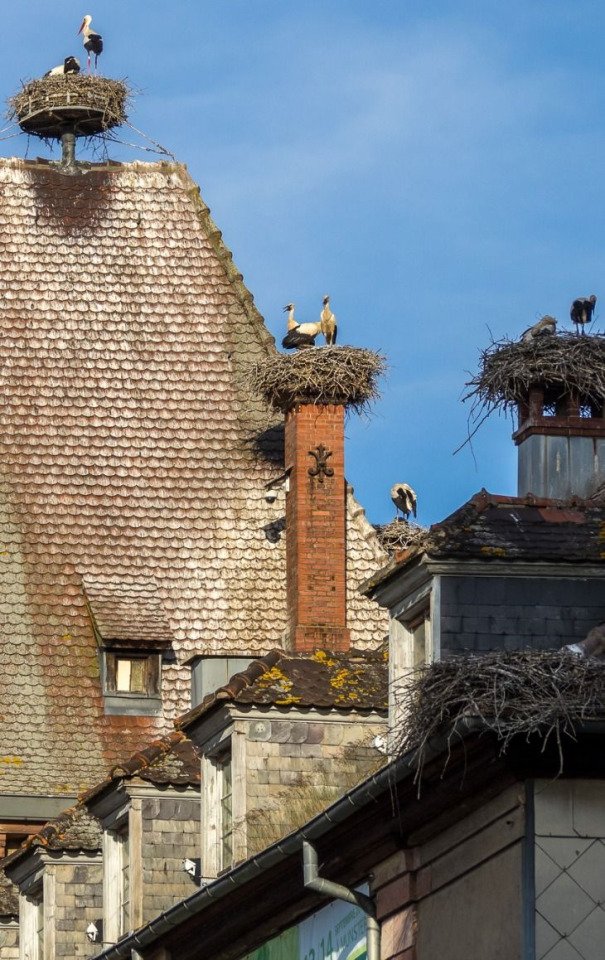

Our logo is a pretzel!
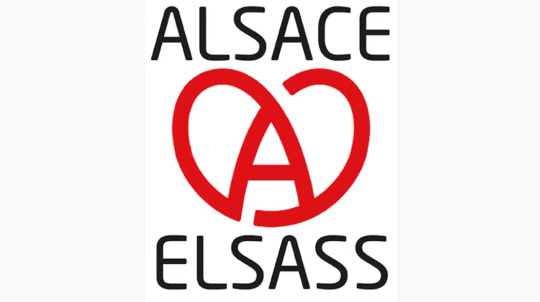
That being said, Alsace has its own regional language!
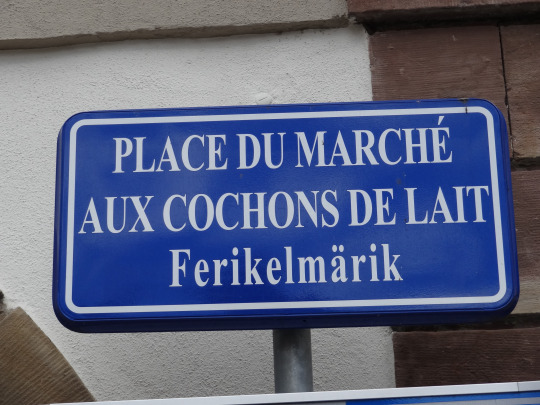

It’s not uncommon to see bilingual signage or to pass someone on the street and hear them speaking Alsatian. You’ll usually hear it from older people, children, or those from rural areas. It’s really fun to listen to and absolutely wild to see written on museum signs!
Kids here will start school learning French, regardless of what they speak at home, which has resulted in a downswing of Alsatian speakers in recent years. That’s why the new regional language law I mentioned waaaaaay above is so important. It’ll allow schools to teach most of the day in Alsatian instead of French with the goal being fully bilingual adults! :)
As of right now, most kids here choose German or English (depending on the school) as their second language. Some kids pick Alsatian and honestly? Good for them! I’m glad!
256 notes
·
View notes
Note
what do you think of the whole actor in shrine situation? is this why you're moving away from s/h//l?
lol

A medieval fisherman is said to have hauled up a three-foot-long cod, which was common enough at the time. And the fact that the cod could talk was not especially surprising. But what was astonishing was that it spoke an unknown language. It spoke Basque.
This Basque folktale shows not only the Basque attachment to their orphan language, indecipherable to the rest of the world, but also their tie to the Atlantic cod, Gadus morhua, a fish that has never been found in Basque or even Spanish waters.
The Basques are enigmatic. They have lived in what is now the northwest corner of Spain and a nick of the French southwest for longer than history records, and not only is the origin of their language unknown, but the origin of the people themselves remains a mystery also. According to one theory, these rosy-cheeked, dark-haired, long-nosed people were the original Iberians, driven by invaders to this mountainous corner between the Pyrenees, the Cantabrian Sierra, and the Bay of Biscay. Or they may be indigenous to this area.
They graze sheep on impossibly steep, green slopes of mountains that are thrilling in their rare, rugged beauty. They sing their own songs and write their own literature in their own language, Euskera. Possibly Europe’s oldest living language, Euskera is one of only four European languages—along with Estonian, Finnish, and Hungarian—not in the Indo-European family. They also have their own sports, most notably jai alai, and even their own hat, the Basque beret, which is bigger than any other beret.
Though their lands currently reside in three provinces of France and four of Spain, Basques have always insisted that they have a country, and they call it Euskadi. All the powerful peoples around them—the Celts and Romans, the royal houses of Aquitaine, Navarra, Aragon, and Castile; later Spanish and French monarchies, dictatorships, and republics—have tried to subdue and assimilate them, and all have failed. In the 1960s, at a time when their ancient language was only whispered, having been outlawed by the dictator Francisco Franco, they secretly modernized it to broaden its usage, and today, with only 800,000 Basque speakers in the world, almost 1,000 titles a year are published in Euskera, nearly a third by Basque writers and the rest translations.
“Nire aitaren etxea / defendituko dut. / Otsoen kontra” (I will defend / the house of my father. / Against the wolves) are the opening lines of a famous poem in modern Euskera by Gabriel Aresti, one of the fathers of the modernized tongue. Basques have been able to maintain this stubborn independence, despite repression and wars, because they have managed to preserve a strong economy throughout the centuries. Not only are Basques shepherds, but they are also a seafaring people, noted for their successes in commerce. During the Middle Ages, when Europeans ate great quantities of whale meat, the Basques traveled to distant unknown waters and brought back whale. They were able to travel such distances because they had found huge schools of cod and salted their catch, giving them a nutritious food supply that would not spoil on long voyages.
Basques were not the first to cure cod. Centuries earlier, the Vikings had traveled from Norway to Iceland to Greenland to Canada, and it is not a coincidence that this is the exact range of the Atlantic cod. In the tenth century, Thorwald and his wayward son, Erik the Red, having been thrown out of Norway for murder, traveled to Iceland, where they killed more people and were again expelled. About the year 985, they put to sea from the black lava shore of Iceland with a small crew on a little open ship. Even in midsummer, when the days are almost without nightfall, the sea there is gray and kicks up whitecaps. But with sails and oars, the small band made it to a land of glaciers and rocks, where the water was treacherous with icebergs that glowed robin’s-egg blue. In the spring and summer, chunks broke off the glaciers, crashed into the sea with a sound like thunder that echoed in the fjords, and sent out huge waves. Eirik, hoping to colonize this land, tried to enhance its appeal by naming it Greenland.
Almost 1,000 years later, New England whalers would sing: “Oh, Greenland is a barren place / a place that bears no green / Where there’s ice and snow / and the whale fishes blow / But daylight’s seldom seen.”
Eirik colonized this inhospitable land and then tried to push on to new discoveries. But he injured his foot and had to be left behind. His son, Leifur, later known as Leif Eiriksson, sailed on to a place he called Stoneland, which was probably the rocky, barren Labrador coast. “I saw not one cartload of earth, though I landed many places,” Jacques Cartier would write of this coast six centuries later. From there, Leif’s men turned south to “Woodland” and then “Vineland.” The identity of these places is not certain. Woodland could have been Newfoundland, Nova Scotia, or Maine, all three of which are wooded. But in Vineland they found wild grapes, which no one else has discovered in any of these places.
The remains of a Viking camp have been found in Newfoundland. It is perhaps in that gentler land that the Vikings were greeted by inhabitants they found so violent and hostile that they deemed settlement impossible, a striking assessment to come from a people who had been regularly banished for the habit of murdering people. More than 500 years later the Beothuk tribe of Newfoundland would prevent John Cabot from exploring beyond crossbow range of his ship. The Beothuk apparently did not misjudge Europeans, since soon after Cabot, they were enslaved by the Portuguese, driven inland, hunted by the French and English, and exterminated in a matter of decades.
How did the Vikings survive in greenless Greenland and earthless Stoneland? How did they have enough provisions to push on to Woodland and Vineland, where they dared not go inland to gather food, and yet they still had enough food to get back? What did these Norsemen eat on the five expeditions to America between 985 and 1011 that have been recorded in the Icelandic sagas? They were able to travel to all these distant, barren shores because they had learned to preserve codfish by hanging it in the frosty winter air until it lost four-fifths of its weight and became a durable woodlike plank. They could break off pieces and chew them, eating it like hardtack. Even earlier than Eirik’s day, in the ninth century, Norsemen had already established plants for processing dried cod in Iceland and Norway and were trading the surplus in northern Europe.
The Basques, unlike the Vikings, had salt, and because fish that was salted before drying lasted longer, the Basques could travel even farther than the Vikings. They had another advantage: The more durable a product, the easier it is to trade. By the year 1000, the Basques had greatly expanded the cod markets to a truly international trade that reached far from the cod’s northern habitat.
In the Mediterranean world, where there were not only salt deposits but a strong enough sun to dry sea salt, salting to preserve food was not a new idea. In preclassical times, Egyptians and Romans had salted fish and developed a thriving trade. Salted meats were popular, and Roman Gaul had been famous for salted and smoked hams. Before they turned to cod, the Basques had sometimes salted whale meat; salt whale was found to be good with peas, and the most prized part of the whale, the tongue, was also often salted.
Until the twentieth-century refrigerator, spoiled food had been a chronic curse and severely limited trade in many products, especially fish. When the Basque whalers applied to cod the salting techniques they were using on whale, they discovered a particularly good marriage because the cod is virtually without fat, and so if salted and dried well, would rarely spoil. It would outlast whale, which is red meat, and it would outlast herring, a fatty fish that became a popular salted item of the northern countries in the Middle Ages.
Even dried salted cod will turn if kept long enough in hot humid weather. But for the Middle Ages it was remarkably long-lasting—a miracle comparable to the discovery of the fast-freezing process in the twentieth century, which also debuted with cod. Not only did cod last longer than other salted fish, but it tasted better too. Once dried or salted—or both—and then properly restored through soaking, this fish presents a flaky flesh that to many tastes, even in the modern age of refrigeration, is far superior to the bland white meat of fresh cod. For the poor who could rarely afford fresh fish, it was cheap, high-quality nutrition.
In 1606, Gudbrandur Thorláksson, an Icelandic bishop, made this line drawing of the North Atlantic in which Greenland is represented in the shape of a dragon with a fierce, toothy mouth. Modern maps show that this is not at all the shape of Greenland, but it is exactly what it looks like from the southern fjords, which cut jagged gashes miles deep into the high mountains. (Royal Library, Copenhagen)
Catholicism gave the Basques their great opportunity. The medieval church imposed fast days on which sexual intercourse and the eating of flesh were forbidden, but eating “cold” foods was permitted. Because fish came from water, it was deemed cold, as were waterfowl and whale, but meat was considered hot food. The Basques were already selling whale meat to Catholics on “lean days,” which, since Friday was the day of Christ’s crucifixion, included all Fridays, the forty days of Lent, and various other days of note on the religious calendar. In total, meat was forbidden for almost half the days of the year, and those lean days eventually became salt cod days. Cod became almost a religious icon—a mythological crusader for Christian observance.
The Basques were getting richer every Friday. But where was all this cod coming from? The Basques, who had never even said where they came from, kept their secret. By the fifteenth century, this was no longer easy to do, because cod had become widely recognized as a highly profitable commodity and commercial interests around Europe were looking for new cod grounds. There were cod off of Iceland and in the North Sea, but the Scandinavians, who had been fishing cod in those waters for thousands of years, had not seen the Basques. The British, who had been fishing for cod well offshore since Roman times, did not run across Basque fishermen even in the fourteenth century, when British fishermen began venturing up to Icelandic waters. The Bretons, who tried to follow the Basques, began talking of a land across the sea.
Bench ends from St. Nicolas’ Chapel in a town by the North Sea, King’s Lynn, Norfolk, England, carved circa 1415, depict the cod fishery. (Victoria and Albert Museum, London)
In the 1480s, a conflict was brewing between Bristol merchants and the Hanseatic League. The league had been formed in thirteenth-century Lübeck to regulate trade and stand up for the interests of the merchant class in northern German towns. Hanse means “fellowship” in Middle High German. This fellowship organized town by town and spread throughout northern Europe, including London. By controlling the mouths of all the major rivers that ran north from central Europe, from the Rhine to the Vistula, the league was able to control much of European trade and especially Baltic trade. By the fourteenth century, it had chapters as far north as Iceland, as far east as Riga, south to the Ukraine, and west to Venice.
For many years, the league was seen as a positive force in northern Europe. It stood up against the abuses of monarchs, stopped piracy, dredged channels, and built lighthouses. In England, league members were called Easterlings because they came from the east, and their good reputation is reflected in the word sterling, which comes from Easterling and means “of assured value.”
But the league grew increasingly abusive of its power and ruthless in defense of trade monopolies. In 1381, mobs rose up in England and hunted down Hanseatics, killing anyone who could not say bread and cheese with an English accent.
The Hanseatics monopolized the Baltic herring trade and in the fifteenth century attempted to do the same with dried cod. By then, dried cod had become an important product in Bristol. Bristol’s well-protected but difficult-to-navigate harbor had greatly expanded as a trade center because of its location between Iceland and the Mediterranean. It had become a leading port for dried cod from Iceland and wine, especially sherry, from Spain. But in 1475, the Hanseatic League cut off Bristol merchants from buying Icelandic cod.
Thomas Croft, a wealthy Bristol customs official, trying to find a new source of cod, went into partnership with John Jay, a Bristol merchant who had what was at the time a Bristol obsession: He believed that somewhere in the Atlantic was an island called Hy-Brasil. In 1480, Jay sent his first ship in search of this island, which he hoped would offer a new fishing base for cod. In 1481, Jay and Croft outfitted two more ships, the Trinity and the George. No record exists of the result of this enterprise. Croft and Jay were as silent as the Basques. They made no announcement of the discovery of Hy-Brasil, and history has written off the voyage as a failure. But they did find enough cod so that in 1490, when the Hanseatic League offered to negotiate to reopen the Iceland trade, Croft and Jay simply weren’t interested anymore.
Where was their cod coming from? It arrived in Bristol dried, and drying cannot be done on a ship deck. Since their ships sailed out of the Bristol Channel and traveled far west of Ireland and there was no land for drying fish west of Ireland—Jay had still not found Hy-Brasil—it was suppposed that Croft and Jay were buying the fish somewhere. Since it was illegal for a customs official to engage in foreign trade, Croft was prosecuted. Claiming that he had gotten the cod far out in the Atlantic, he was acquitted without any secrets being revealed.
To the glee of the British press, a letter has recently been discovered. The letter had been sent to Christopher Columbus, a decade after the Croft affair in Bristol, while Columbus was taking bows for his discovery of America. The letter, from Bristol merchants, alleged that he knew perfectly well that they had been to America already. It is not known if Columbus ever replied. He didn’t need to. Fishermen were keeping their secrets, while explorers were telling the world. Columbus had claimed the entire new world for Spain.
Then, in 1497, five years after Columbus first stumbled across the Caribbean while searching for a westward route to the spice-producing lands of Asia, Giovanni Caboto sailed from Bristol, not in search of the Bristol secret but in the hopes of finding the route to Asia that Columbus had missed. Caboto was a Genovese who is remembered by the English name John Cabot, because he undertook this voyage for Henry VII of England. The English, being in the North, were far from the spice route and so paid exceptionally high prices for spices. Cabot reasoned correctly that the British Crown and the Bristol merchants would be willing to finance a search for a northern spice route. In June, after only thirty-five days at sea, Cabot found land, though it wasn’t Asia. It was a vast, rocky coastline that was ideal for salting and drying fish, by a sea that was teeming with cod. Cabot reported on the cod as evidence of the wealth of this new land,
New Found Land, which he claimed for England. Thirty-seven years later, Jacques Cartier arrived, was credited with “discovering” the mouth of the St. Lawrence, planted a cross on the Gaspé Peninsula, and claimed it all for France. He also noted the presence of 1,000 Basque fishing vessels. But the Basques, wanting to keep a good secret, had never claimed it for anyone.
17 notes
·
View notes
Note
Hi! What’s happening in Spain and Catalan right now?? I’ve heard Vox is trying to limit or remove Catalan from certain cities/regions. Is that true? Is there anything that can be done to counteract them? Una abraçada molt forta!
A lot of things are happening (most of the attention right now is on the people who are going to trial these days for having taken part in demonstrations or general strikes) but on the language part, yes what you’re referring to is how Vox and PP are proposing motions in different Valencian city halls to ban the use of Valencian-Catalan* language in schools of that city, most recently in Alacant (one of the three province capital cities, so an important city). Here’s a newspaper article about it (in Valencian-Catalan).
Luckily, in the end more parties voted against it (Compromís as was expected, and also Unides Podem and PSPV) so the law technically keeps Valencian to be used in public schools. However, this is a tricky matter because even if the law says that class should be given in the native language of the city/country (that is, in Valencian), it does not happen in reality. Most classes in the Valencian Country are given in Spanish, especially in bigger cities. For example, in the capital city (València), only 2 out of every 10 seats offered in schools use Valencian as the language of teaching, while the remaining 8 out of 10 use Spanish (source).
At the same time, the Supreme Court of Spain has reduced the number of hours that can be taught in the Catalan languages in the schools of Catalonia. These legal actions proposed by Catalanophobic far right-wing groups and enabled by all the powers of the Spanish State are targeting all the Catalan-speaking territories.
This legal debate on whether the local language should be used or only Spanish can be used in education has to be understood in context. We are in a situation of language emergency, when our language is quickly declining in use as a result of the imposition of Spanish in many settings and because we have internalized the idea that our language is somehow worse and useless. The results of these changes in legislation will be to reinforce the ideas that Spanish fascism and other forms of Spanish cultural-linguistic imperialism have been spreading for centuries, mainly that the languages that Spanish wants to replace (Catalan-Valencian, Aranese Occitan, Galician, Basque, Asturian-Leonese, Aragonese) are not fit for academic purposes or for the modern world. Their belief is that there are “inferior languages” (such as ours) that are incapable of the same things as the “superior languages” (Spanish, English, French, etc). This is why education has been an important linguistic battle field, because through it we can prove that we can talk about science, philosophy, language, maths, technology, or anything we need in our language. Because languages are not inferior or superior, same way their peoples are not inferior nor superior.
School also remains (theoretically) one of the few places where children from families who don’t speak Catalan at home will learn Catalan. Because, while children from Catalan-speaking families will learn Spanish anyway because it’s all around, the opposite often doesn’t happen. That is why we consider public education one of the pillars of language survival, especially in societies that receive quite a lot of immigration as we do, because otherwise the speakers become isolated and have to change to using Spanish.
It’s also worth saying that the Spanish media (including the public media payed with our taxes) have been paving the way for legal restrictions and social disdain against the languages of national minorities but especially Catalan-Valencian. All the time there are “debates” where Spanish people argue about how bad Catalans are and how the Catalan language is a threat to Spanish (yes, according to these people a language with 10 million speakers, most of whom don’t even use the language in their everyday lives, is a threat to a language with 586 million speakers and with as much political and economical power as Spanish). All the time they bring “witnesses” to explain their horrible experiences with a Catalan-speaker who was so incredibly rude as to, oh horror, speak to them in Catalan and expect them to understand. Recently these ~horror stories~ have been getting more extreme, with Spanish people claiming that they were once threatened for not speaking Catalan and things like this. (Oh boy, if I had to list every time I have been threatened for speaking Catalan and not Spanish! especially on the internet... if we are to get in this competition there is no doubt on who would win, but they will never give a platform for us to explain what our communities face). Unsurprisingly, many of these “witnesses” don’t even live/study where they claim they do, many are members of fascist associations like SCC and the media doesn’t mention that, and many have been found giving contrary witness in different TV channels. For example, I remember the case of a girl named Julia who said on Antena3 she was a young university student in Catalonia who was threatened for not being pro-independence and the next week she said on another program that she has graduated from two majors and now she works and other details of her life where too different. This girl also said she is apolitical, but if you look her up you can see she is a member of the fascist organization SCC, and you can even see her wearing a SCC wristband in the interviews on TV. Or when they pretend to interview random people on the street and they have been carefully chosen. For example, once the same channel (A3) interviewed a woman who they said was a tourist complaining that the city signs of València were written in Valencian and how she couldn’t understand anything and that would lead to traffic accidents, but people recognised her as a journalist who had worked in the Valencian TV and spoke Valencian (here’s a video of her doing both things).
So people who live in Spain and get their news from these manipulative sources will think this is what happens, and are more likely to vote and support parties who make Catalanophobia (and discrimination of other national minorities) one of their main talking points. That’s how the fascist party Vox has gained so much support and won seats in elections recently.
I would say that what can be done to counteract them is to stop spreading the lies of the Spanish media that is owned by the big businesses (Antena3, LaSexta, etc) and the Spanish government, and instead switch to Spanish journalism that does an honest job (for example, Público newspaper); not vote for right-wingers; encourage people to continue to speak their language; help make entertainment and everyday-life activities available in Catalan (for example, ask for Instagram to translate the app, Disney+ and Netflix to add the option to see the Catalan dub/subtitles that have already been made, etc), and of course attend protests.
Thank you for your interest!
(*Note to make sure everything is clear: “Valencian” and “Catalan” are two names for the same language. The word “Valencian” is just how the Catalan language is called by speakers from the Valencian Country, while the term “Catalan” is traditionally used by the speakers from Catalonia, Andorra, the Balearic Islands, la Franja and l’Alguer. It’s equally correct to use both words and they mean the same).
94 notes
·
View notes
Text
10 facts about Basque language
1 - It's one of the oldest living languages in Europe, predating Indo-European.
2 - In fact there's a theory defending our language was already in use during Neolithic times, since the name we use for many tools may bring the root for stone, meaning the name was born when the tools were made of stone.
3 - It's so important to Basque people we call our land "The land of the Basque language". We call our language Euskara, and any other language was simply referred to as erdara.
4 - It has no gender and 13 linguistic cases. Accent depends mainly on declension.
5 - Euskara uses a vigesimal counting system, so we say 4*20+10+5 instead of 95.
6 - Basque has 7 dialects, and around 1M speakers.
7 - It's one of the best represented languages on Wikipedia, with more than 400,000 articles.
8 - It has survived centuries of legislation that punished its use and wanted it erased. Children went to clandestine Basque schools during Franco's dictatorship, while teachers and parents risked themselves to a death sentence if caught.
9 - Basque has its own family of fonts, rescued from the traditional engraving of tombstones.
10 - It's a growing language: in Euskadi there are 250,000 Basque speakers more than 30 years ago.
#euskal herria#basque country#pays basque#euskadi#pais vasco#culture#euskera#euskara#basque#euskararen eguna#international day of the basque language#fun facts
268 notes
·
View notes
Text


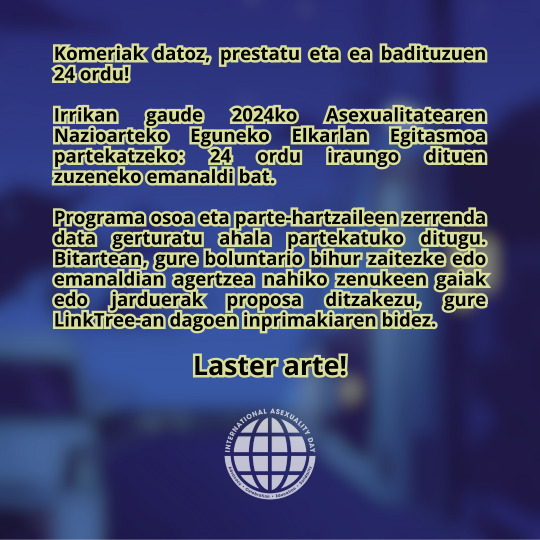










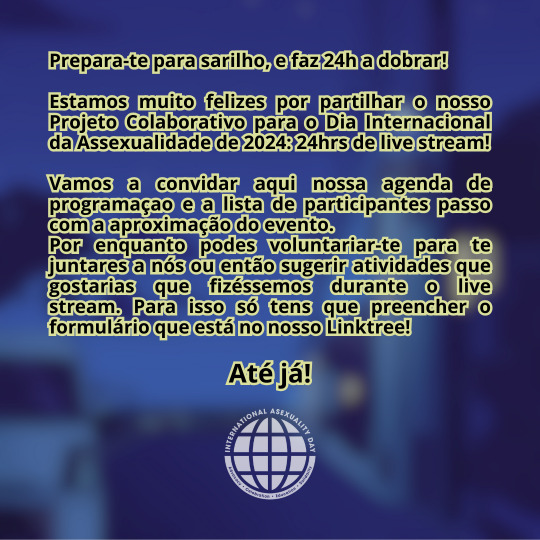

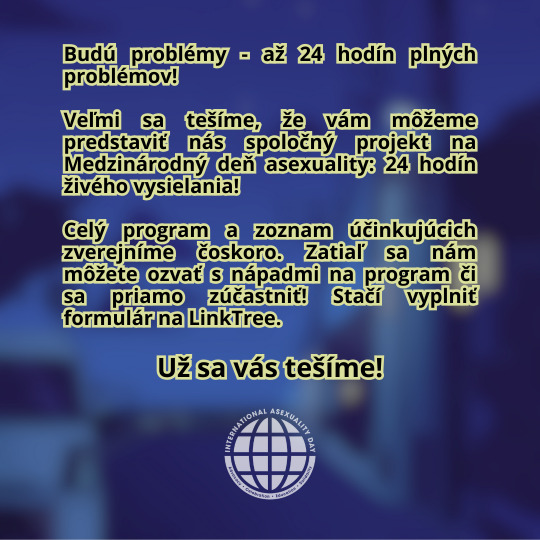

Prepare for trouble, and make it double 24h!
We are incredibly excited to share our Collaborative Project for International Asexuality Day 2024: a 24hs Livestream.
We will share a full schedule and list of participants closer to the date. Meanwhile, you can volunteer to join us or suggest topics or activities you'd like to see in the livestream through the form on the LinkTree on our bio.
We have translated the livestream announcement into 15 different languages, which you can find as pictures in this post. Each picture contains the written version as image description for accessibility. The languages, in alphabetical order, are:
Basque
Catalan
Czech
Danish
Dutch
French
German
Greek
Italian
Nepali
Polish
Portuguese
Russian
Slovak
Spanish
See you there!
#iad#asexuality#asessualità#asexualidad#aseksualiteit#assexualidade#aseksualitetsdag#asexualité#Ασεξουαλικότητας#asexualität#aseksualności#asexualitatearen#Асексуальности#lgbtqia+
9 notes
·
View notes
Text
I have a (not so hidden) passion for minority languages, in particular the Celtic languages. I also have a rather unhealthy tendency to jump straight to the comments section of articles I know are going to attract certain fine specimens of brain rot (if you're ever looking for a cheap thrill, type "Irish language" into the news section of whatever browser you use and feel your blood pressure rise 10 points). I went down this rabbit hole just yesterday, and of course the same tired tropes we're all familiar with were there in full force.
Now, analyzing the real, underlying structures for this particular branch of bad faith reasoning, while ultimately the actual issue here, is just too complex and too deeply rooted in systems of colonialism and imperialism to handle in a Tumblr post. What I'd like to focus on instead, however, is one particularly insidious argument that pops up again, and again, and again, so much so that it's managed to position itself at the center of the debate despite being based on a false premise.
Go to any article and you’ll see it. “Why are we teaching our children Irish/Welsh/Basque?” UKBrexit_rule_britannia@BorisJ1945 will bemoan. “There isn’t any money at all in it!” This is the Bloody Mary of language articles; write “Gaeilge” three times and it’ll appear, smelling of roast beef and unwashed ears.
The problem with this question is that at face value, it’s hard to answer. That’s because without a bit of reflection it seems to be true. After all, learning a Celtic, or an Iroquoian, or a Siberian, or what-have-you language likely won’t ever land you a job in sales; no one’s going to be interviewing for Google using Breton (for now, at least [Hep brezhoneg Breizh epet!]). The same bad faith commenters will also argue that the opportunities that do exist (translation, teaching, careers in the media, etc.) are those meant to propagate the language, a linguistic pyramid scheme of sorts. If taken as a rational position, it is hard to argue that any of these languages are as economically viable as their more dominant counterparts.
Yet still, this still feels wrong, and if we look more closely at what these people are saying we start to see why. Basically, language is being boiled down to its economic utility. Why learn something that won’t earn you money down the line? It’s common sense, right?
Now, you could respond to this with socialist ideals; believe me, I’m all for socialist ideals. Yet instead, I’m reminded of a conversation I once had in college, and what went wrong in that conversation seems to apply here as well. At that time, I lived in a close-knit dorm with a group of math majors, which was just as unfortunate as it sounds. These math majors, who to me at least seemed to act in a sort of hive mind, once said that global linguistic diversity was more of a hindrance than anything else, and that it would make more sense (or at least be more efficient) to eliminate all the world’s languages and replace them with one, international language. That language, of course, just happened to be English.
And there’s the rub, isn’t it? When asked if they would theoretically consider switching to languages like Esperanto or Mandarin Chinese, their response was that that would be impractical, that English was the dominant language and that it was going to stay that way. The idea that their language, their way of thinking, could one day become extinct was too frightening, too unthinkable for them to even humor. Even if they had answered yes for the sake of the argument, I think in a real world scenario their response would have been a little less motivated by efficiency and reason.
Rationally, the idea of replacing one language with another should not be a scary thought. Yet it is a deeply unsettling idea, one that often bring out the worst impulses in people and cultures. It is also a concept that most English speakers rarely have to consider. Not that the idea is completely foreign to them; for example, look at the horrible racism speakers of Mandarin and Spanish face across the English-speaking world, partly because their language (and therefore their way of life) is perceived as a threat. Economically, both Mandarin and Spanish could make more sense as the international language of business; they are the two languages with the most native speakers in the world, both represent economies that are playing larger and larger roles across the globe, and in the case of Spanish, its pronunciation is more accessible than other European languages (certainly more than English). Yet the vitriolic, racist “great replacement” theories that these language communities are met with act as grim proof that issues of language strike nerves that run far deeper than its use in commerce.
This is because language is so much more than just a tool. Trying to make rational, economic decisions about a community language will not work because language exists outside of these metrics. Language is as mundane, crass, and mercenary as it is beautiful, sophisticated, and sacred, and our relationships to our languages, be they our native tongues or ones we’ve picked up along the way, are so intricately tied to our relationships with ourselves and our surroundings that it is impossible to distinguish one from the other. The thought that the languages we speak in, think in, love in could one day disappear is enough to make most of us begin to shudder. People still study Latin in high school; maybe 500 years from now, niche groups will speak what we now know as English together over card games. The minority languages being targeted now, however, are living, community languages, languages that people use daily and want to pass on to their children to secure their future. It is an insult, and a gross misunderstanding of the role language plays, to try and put a price on them.
The Breton phrase I gratuitously quoted above (Hep brezhoneg, Breizh epet) translates to “without Breton, there is no Brittany.” In Ireland, a phrase commonly used at language rights events is “tír gan teanga, tír gan anam” — a land without a language is a land without a soul. Language is our soul — and what, exactly, is the cost of that?
51 notes
·
View notes
Text
Utapri Language Headcanons
Note: I haven’t played the games, so I don’t know if any characters are confirmed to be multilingual. These are just headcanons based on their personalities and interests.
* Haruka- basic English from her school days. She knows some fragmented Italian from working on a few operas and studying music terminology. She’s also learning some Agnacian so Cecil can speak his own language with someone.
* Tomochika- English and Korean because she does some international work in America and South Korea.
* Otoya- basic English that he’s slowly improving.
* Masato- English and Mandarin because they would be useful languages for taking over the family business.
* Natsuki- French and Basque. I headcanon him as having some French blood, and the Basque region just feels right.
* Tokiya- this bookworm is a polyglot. It probably started with him wanting to be able to read more types of books. I can see him picking up languages for fun, though. English, German, Mandarin, Cantonese, and Korean. His next goal is the Romance languages and Vietnamese.
* Ren- proficient in most of the Romance languages, but fluent in Italian. Seduction is his goal, and he loves the way the languages roll and flow.
* Syo- English and a smattering of French from accompanying his father to Fashion Week.
* Cecil- Agnacian, English, and Arabic for diplomatic purposes. Probably passable at Hebrew, Greek, and Farsi for the same reasons.
* Reiji- English! He loves the UK, so his English has a British clip to it. He’s fluent. He probably knows a tiny bit of German, too.
* Ranmaru- coarse German from time spent in the live houses there.
* Ai- any language, but with a Google Translate level of accuracy unless he studies the language more intentionally.
* Camus- I believe the language of Permafrost is a dialect of French, so he can speak both the dialect and standard French (lmao, imagine him having a northern France accent). I see him also speaking English and German because of his diplomatic affairs.
* Eiichi- English and Spanish. He’s a world-traveler, and those two languages are useful to know. His Spanish has a slight Colombian accent because that’s where he stayed the longest.
* Eiji- English
* Kira- English and Mandarin because of the family business.
* Nagi- another polyglot. I can see Nagi having an interest in Slavic languages, so Russian and Polish. He also speaks English because it’s useful, Korean because he works in Seoul on occasion, and then Gaelic for a challenge.
* Van- rough English, but decent Cantonese, which surprises everyone who hears him.
* Yamato- basic English. He doesn’t think he even needs that, but he excelled in the oral part of English class despite not caring.
* Shion- Ancient Greek for some vague reason.
* Ringo- English and Korean because they’re the most useful in his idol work.
* Ryuuya- English.
#utapri#heavens#starish#headcanon#quartet night#Nanami Haruka#uta no prince sama#my post#my headcanons
41 notes
·
View notes
Text
Holidays 12.3
Holidays
Advocate's Day (India)
Be a Blessing Day
Alka Seltzer Day
Doctor’s Day (Cuba)
E-Discovery Day
Elf Day (UK)
Flag Day (Saba)
Heart Transplant Day
Inflatable Pig Day
International Baboon Day
International Day of Persons with Disabilities (UN)
International Day of the Basque Language
Jazz Day
King Tupou I Day (Tonga)
Let's Hug Day
Make a Gift Day
National Roof-Over-Your-Head Day
Reinvigorate Your Brain by Reading Something Day
Saba Day (Saba)
San Francisco Javier (Navarra, Spain)
Takata no Inoko (Peace & Good Harvest Festival; Japan)
Telescope Day
Tinsel Day
Food & Drink Celebrations
Holiday Ale Festival begins (Portland, Oregon) [Begins in late Nov/early Dec] (Postponed for 2022)
International Trappist Beer Day
National Apple Pie Day [also 5.13]
National Green Bean Casserole Day
National Ice Cream Box Day
National Peppermint Latte Day
1st Saturday in December
Bike Shop Day [1st Saturday]
Chester Greenwood Day (Inventor of Earmuffs; Farmington, Maine) [1st Saturday]
Coats and Toys for Kids Day [1st Saturday]
Earmuff Day [1st Saturday]
Global Fat Bike Day [1st Saturday]
International Spirit of the Game [1st Saturday]
National Pinochle Day [1st Saturday]
National Play Outside Day [1st Saturday of Every Month]
National Rhubarb Vodka Day [1st Saturday]
Satyr's Day (Silenus, Greek God of Beer Buddies and Drinking Companions) [1st Saturday of Each Month]
SKYWARN Recognition Day [1st Saturday]
World Pear Day [1st Saturday]
Independence Days
Illinois Statehood Day (#21; 1818)
Feast Days
Abbo of Auxerre (Christian; Saint)
Abraham of Alexandria, Pope (Coptic)
Adrian (a.k.a. Ethernan; Christian; Saint)
Birinus (Christian; Saint)
Bogatir Svatogor Day (Asatru/Slavic Pagan)
Bona Dea Festival (Roman Goddess of Good)
Cassian of Tangier (Christian; Saint)
Copernicus (Positivist; Saint)
Emma (of Lesum or of Bremen; Christian; Saint)
Festival for Serket/Selket (Scorpion Goddess; Ancient Egypt)
Francis Xavier (Christian; Saint)
Godzilla Day (Church of the SubGenius; Saint)
International Say No to Selfies Day (Pastafarian)
Johann Nepomuk von Tschiderer zu Gleifheim (Christian; Blessed)
Lucius (Christian; Saint)
Motorettes (Muppetism)
Pompaia (Procession to Zeus; Ancient Greece)
Sola (Christian; Saint)
Vibrator Day (Pastafarian)
Zephaniah (Christian; Saint)
Lucky & Unlucky Days
Prime Number Day: 337 [68 of 72]
Tomobiki (友引 Japan) [Good luck all day, except at noon.]
Premieres
The BBC Television Shakespeare (UK TV Series; 1978)
Black Swan (Film; 2010)
Brown Sugar, recorded by The Rolling Stones (Song; 1969)
Camelot (Broadway Musical; 1960)
Concerto in F, by George Gershwin (Piano Concerto; 1925)
Confess, by Patti Page (Song; 1947) [1st Recording with Overdubbed Vocals]
Dark Was the Night, Cold Was the Ground, recorded by Blind Willie Johnson (Song; 1927)
Do They Know It’s Christmas? (Charity Song; 1984)
Elvis (TV Special; 1968)
Justify My Love, by Madonna (Music Video; 1990)
Machine Head, recorded by Deep Purple (Album; 1971)
My Generation, by The Who (Album; 1965)
Rudolph the Red-Nosed Reindeer (Christmas TV Special; 1964)
Rubber Soul, by The Beatles (Album; 1965)
A Streetcar Named Desire, by Tennessee Williams (Play; 1947)
Symphony #1 in A, by Edward Elgar (Symphony; 1908)
You’re Sixteen, by Ringo Starr (Song; 1973)
Today’s Name Days
Emma, Franz Xaver, Jason (Austria)
Franjo, Lucije, Sofonija (Croatia)
Svatoslav (Czech Republic)
Svend (Denmark)
Leiger, Leino (Estonia)
Meri, Vellamo (Finland)
François-Xavier, Xavier (France)
Franz Xaver, Jason (Germany)
Glykerios (Greece)
Ferenc, Olívia (Hungary)
Francesco, Saverio (Italy)
Daile, Evija, Jogita, Raita (Latvia)
Atalija, Audinga, Gailintas, Ksaveras (Lithuania)
Svein, Sveinung (Norway)
Franciszek, Kasjan, Ksawery, Lucjusz, Unimir (Poland)
Oldrich (Slovakia)
Francisco, Javier (Spain)
Lydia (Sweden)
Javier, Malcolm, Malcom, Malik, Xavier, Xaviera (USA)
Today is Also…
Day of Year: Day 337 of 2022; 28 days remaining in the year
ISO: Day 6 of week 48 of 2022
Celtic Tree Calendar: Ruis (Elder) [Day 8 of 28]
Chinese: Month 11 (Dōngyuè), Day 10 (Geng-Yin)
Chinese Year of the: Tiger (until January 22, 2023)
Hebrew: 9 Kislev 5783
Islamic: 9 Jumada I 1444
J Cal: 7 Zima; Sixday [7 of 30]
Julian: 20 November 2022
Moon: 81%: Waxing Gibbous
Positivist: 1 Bichat (12th Month) [Copernicus]
Runic Half Month: Is (Stasis) [Day 9 of 15
Season: Autumn (Day 72 of 90)
Zodiac: Sagittarius (Day 11 of 30)
Calendar Changes
Bichat (Modern Science) [Month 13 of 13; Positivist]
0 notes